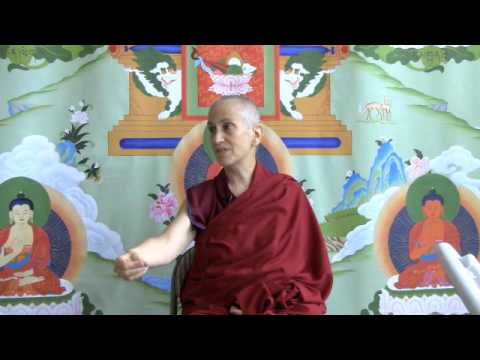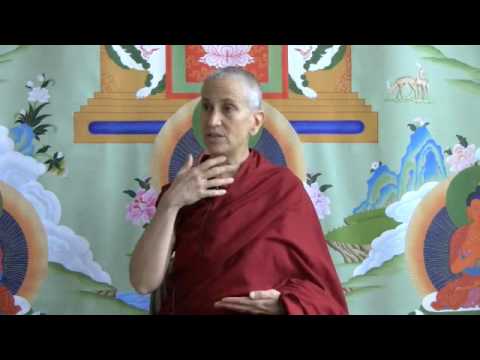Attachment to reputation
Part of a series of Bodhisattva's Breakfast Corner talks given during the Green Tara Winter Retreat from December 2009 to March 2010.
- We can be overly sensitive to what others say about us
- Attachment to reputation is related to our anger at criticism
- We need to familiarize ourselves with the antidotes before the situation arises
Green Tara Retreat 025: Attachment to reputation (download)
Somebody wrote in and said, “I know I tend to be too sensitive and take people’s comments too seriously, when I know intellectually there is no need to worry or be angry at what others say to me. Am I not applying the antidotes for anger fast enough?
Does that question resonate with anybody? Is anybody here too sensitive about what other people say about them? Only you? Oh, two others, three, four, five? You two don’t have your hands up, that’s fantastic.
This is a big problem, isn’t it? I read a study about what people were more afraid of: public speaking or death. They were more afraid of public speaking than death. Why? Because when speaking publicly you’re out there, and there’s the potential for people to criticize you. Even if you’re not doing a public speech, even if you’re just talking to two or three people, it’s still public, isn’t it? There’s the potential that somebody will go, “Oh…” Then we get upset and we doubt ourselves. We get anxious. Even before we’re with the people, we get anxious. After we’re with the people, our mind just spins. Meanwhile the other people are actually too busy thinking about themselves to think about us. We just think that they are always thinking about us, don’t we?
So, yes, we aren’t applying the antidotes to anger fast enough. There are a few elements here. One is that we need to be familiar with the antidotes to anger before the situation arises. That’s why it’s good to do continuous meditation on far-reaching fortitude or far-reaching patience. Read Chapter 6 in Guide to a Bodhisattva’s Way of Life [by Shantideva]. Read Healing Anger [by His Holiness the Dalai Lama]. Read Working with Anger [by Venerable Thubten Chodron]. And then practice it.
Why do we get so angry when we’re afraid of what people are going to say to us? The degree of the anger corresponds with the degree of the attachment we have for our reputation, and the degree of attachment we have to hearing nice ego-pleasing words. The more we want to hear nice words and have a good reputation, the more anxious we’re going to be thinking that we won’t get those or that we’ll get the opposite and people might criticize us, or ridicule us, or disagree with our ideas. Imagine that!
We have to also work on the attachment angle of it too. There are some parts in Chapter 8 of Guide to a Bodhisattva’s Way of Life where Shantideva talks about attachment to reputation, and praise, and so on. What I find helpful in working with those myself, is to ask myself, “What good does praise do me?” And, “What good does a good reputation do me?” When I actually think about my values in life, what’s important to me? Being kind, keeping good ethical conduct, creating the cause for liberation, generating bodhicitta, realizing emptiness, trying to become a Buddha. Does other people’s approval facilitate any of those things that are really important to me in my life? No. Does a good reputation facilitate any of those things that are important to me in my life? No. Then, why am I so attached to those things? It doesn’t make much sense, does it?
I’ll leave you with that one to think about today. There are some more [ways to think about this]. But that one, I personally find to be very effective.
Audience: I wonder if those comments affect you, for instance, at work, what should we do?
Venerable Thubten Chodron: If those comments affect us at work, then we have to ask, “What’s important to us?” As I was just saying, I do something at work, and my boss doesn’t like it. What’s important to me? Is it my boss’s opinion or who my boss thinks I am? Or, is it my practice on the path to enlightenment? What is really more meaningful to me in my life? Well, it’s working with my own mind and progressing along the path. Now, I don’t just want to ignore what my boss says. If what my boss says is true, then I need to do something about it. If it’s not true, then I can talk to him or her and explain. In either case, what my boss says is not the meaning of my life, is it? My boss is my boss for how long? Not so long. And, it’s only in a work situation and he’s another sentient being, she’s another sentient being. Now if my boss were a Buddha and my boss, and then commented on my behavior, I think I’d listen. That affects the major things that are important to me in my life. If Buddha tells me I’m practicing the path wrong, I’d better listen.
You still listen to what the boss says, but we don’t need to be so reactive to it. What that person says is just one sentient being. How does that person’s praise help our path to enlightenment? How does that person’s criticism harm our path to enlightenment? It doesn’t. If anything, the criticism helps our path to enlightenment because it gives us the opportunity to practice fortitude and to let go of attachment. That’s why bodhisattvas love criticism. That’s why we run away from it as fast as we can.
Venerable Thubten Chodron
Venerable Chodron emphasizes the practical application of Buddha’s teachings in our daily lives and is especially skilled at explaining them in ways easily understood and practiced by Westerners. She is well known for her warm, humorous, and lucid teachings. She was ordained as a Buddhist nun in 1977 by Kyabje Ling Rinpoche in Dharamsala, India, and in 1986 she received bhikshuni (full) ordination in Taiwan. Read her full bio.


